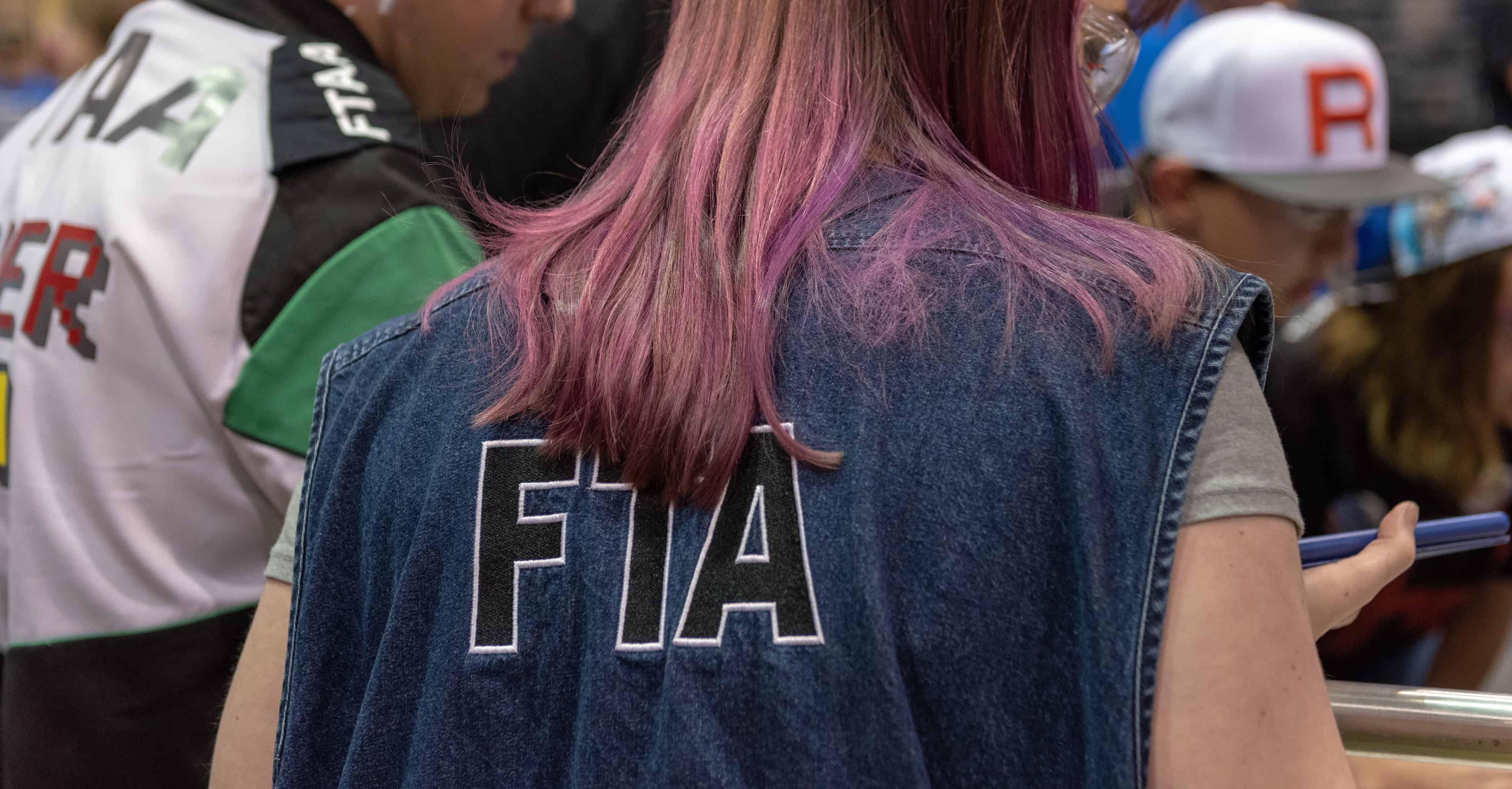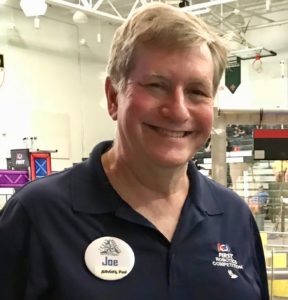
- About
- News
- Programs
- Grants
- Events
- Register
- Resources
- Donate


In our continuing volunteer spotlight series, this month we look at the role of FIRST Technical Advisors more commonly referred to as FTAs. According to the FTA Volunteer Roles and Resources page:
“The FIRST Technical Advisor (FTA) is responsible for keeping the FIRST Robotics Competition field running smoothly and in accordance with FIRST requirements.”
For more detailed information regarding the FTA volunteer role visit the Volunteer Roles and Resources page.
So what is it like to be FIRST Technical Advisor?
A few of our FIRST Technical Advisors (FTAs) shared their stories and experiences to give us a sense of what the role is and how they’ve enjoyed it.
April Riddett works at *National Instruments as a Staff Product Support Engineer for their C-Series Controllers. Her link to FIRST® began with family: “My younger brother was on a FIRST® team while I was in college, and I knew I wanted to get involved when I graduated. Once I volunteered as a CSA at the Alamo Regional, I saw the impact first-hand that this program has on the students and I have been volunteering ever since.”
Tim Ehrlich, an employee from *USAA, says he got his start when he was in college and a local competition needed judges. It was eye-opening for him: “The passion of the kids, teams doing things with Legos that, even being a LEGO® enthusiast myself, I wouldn’t even think of doing. I was hooked. When I moved down to Texas in 2011 for my job, I immediately wanted to be a mentor for some FIRST® team at whatever level.”
 Joe Varnell from *Lockheed Martin began volunteering for FIRST® after his children left the house for college and careers. He needed something to keep him busy: “I thought to myself, ‘I’m a nerd, I need a nerdy hobby.’ I vividly remember walking into the event and looking across the stands and being amazed at what looked like a patchwork quilt made of all the teams in their team colors. I thought to myself, ‘I need to be a part of this!'”
Joe Varnell from *Lockheed Martin began volunteering for FIRST® after his children left the house for college and careers. He needed something to keep him busy: “I thought to myself, ‘I’m a nerd, I need a nerdy hobby.’ I vividly remember walking into the event and looking across the stands and being amazed at what looked like a patchwork quilt made of all the teams in their team colors. I thought to myself, ‘I need to be a part of this!'”
FTA volunteers love the chance to make sure the students are succeeding. “I saw the FTA role as the first line of defense to preventing a student from having a bad experience at an event,” says Riddett. “The FTA is usually the first person they deal with when something goes wrong with their robot.”
The FTA role gives you a chance to help in many ways, as Ehrlich notes: “It covers the normal technical aspects of the role, keeping the field running, troubleshooting problems and fixing them on the fly, but it goes much deeper than that. You’re in a unique position to be able to help students from all different teams, with all manner of issues; from overheating motors, to wonky autonomous mode behavior, to more complex problems like control lag because of bandwidth limitations.”
It also gives you the chance to play a supporting role, yet have a front row seat to the excitement, as Varnell notes: “I could stay sort of in the background, help the students with their robots, and make sure the event goes somewhat smoothly.”
A FIRST® Technical Advisor must manage the field, and this means working well with people. Ehrlich describes it this way: “I really think the most important skills for the role are problem solving, multitasking, and leadership, but also teamwork, and a willingness to learn. A lot of the technical aspects can be learned. You’ll get training as an FTAA (FIRST® Technical Advisor Assistant) or CSA (Control Systems Adviser) on your way to FTA, and you’ll get more training as an FTA.”
“To be an FTA, you should be part techie and part counselor,” says Varnell. “You need to be techie to help the team’s robots connect to the field. However, you can rely on your Control System Advisors (CSAs) and FTAA for a lot of the technical stuff. But then you also have to deal with the people, which for a lot of techies is hard.”
Riddett puts it this way: “They need to be technically competent at troubleshooting problems quickly but also emotionally intelligent to handle any situations that arise. A STEM career isn’t required, but it’s highly encouraged. Typically, FTAs will spend a couple years volunteering as a Control System Advisor (CSA) before spending a couple more years volunteering as an FIRST Technical Advisor Assistant (FTAA) before they can apply to be an FTA.”
One thing is clear, as Riddett notes, you don’t need any experience to provide valuable help for the event. “All we need from you is to show up with a smile and be ready to help us change these kids’ lives,” says Riddett.
You don’t need to have technical skills, in other words, to be an FTA. As Varnell explains, “There is training available for every job.”
In addition, people are sometimes confused about the difference between a mentor and a volunteer. Ehrlich clears it up: “You don’t have to be a mentor to be a volunteer. A mentor is a huge time commitment, but a competition can be just a day or a few hours of your time if that’s what works. There’s plenty of fun things throughout the competition that can always use help. You also don’t have to be technical or in a STEM or robotics-specific field to be a volunteer.”
FTA volunteers all agree on one thing: the experience is deeply rewarding and memorable.
“There was a team at an event last year,” shares Riddett, “who always came to the field with smiles on their faces, excited to play. They ran into problem after problem with their robot, their driver station laptop, you name it. Every time they encountered an issue, they were ready to learn why it happened and how to fix it and move forward. Their determination and optimism was so inspiring to me.”
For Ehrlich, the bonds of friendship have brought some of the best memories: “I make new friends every single year, and it never stops reminding me of why I do this, why I love it so much, why it’s important, and that all these people are the ones who are going to build the society and technological dream world of the future.”
The memories from each event stay with you when you volunteer as an FTA.
Varnell fondly remembers a specific event called RoboReboot: “FRC team 1701 had come from Kansas to go to an offseason event. It was only the Seniors on the team who, many of them, didn’t really work on the robot. It was Aerial Assault, also known as Aerial Assist. They had some issues with their robot and I gave them time to work on it, helped them some, and made sure they had a good time. We all had a great time. 1710 came back the next year because the students had such fun the prior year. I still see them on occasion and Josh, from 1710 that year, is now an FTA.”
Volunteers often enjoy the enthusiastic support of their employers. “I’m very lucky to work for a FIRST supplier, National Instruments (NI),” says April Riddett. “We make the roboRIO control system for FRC robots and also provide LabVIEW for the students to program their robots with. NI allows me to use volunteer time off (VTO) to volunteer with FIRST® without using vacation time. NI also has a program to match employees with mentor and volunteer roles to encourage volunteerism within the FIRST® universe, in addition to supporting FIRST® in many other ways.”
There are very few volunteer opportunities that let you spend time with great people who are creating amazing robotics. As Joe Varnell says, “I’ve been told I smile most of the time at events. It’s only because I’m playing with robots and I’m around a lot of great people!”
Besides the fun of working with robotics, the bonds of friendship and community involvement adds a rewarding depth to the FTA experience.
Tim Ehrlich sums it up this way: “The collaboration, companionship, and camaraderie all the volunteers share every year, every competition, especially here in Texas, is the secret sauce that makes our events so great.”
Looking for a fun and rewarding volunteer opportunity? One that will put you up close to the action happening at FIRST Robotics Competition events? Contact our team at info@firstintexas.org to get started inspiring the next generation of STEM leaders and innovators.
* National Instruments, USAA, and Lockheed Martin are FIRST in Texas Partners supporting FIRST® programs, teams, and events in Texas.